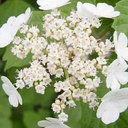UGT1A1 polymorphisms with irinotecan-induced toxicities and treatment outcome in Asians with Lung Cancer: a meta-analysis.
Keywords
Abstract
Previous studies of irinotecan pharmacogenetics have shown that the UGT1A1*28 polymorphism has an effect on irinotecan (IRI)-induced toxicities in Caucasians. Yet compared with the UGT1A1*6 mutation, the UGT1A1*28 occurs at a much lower frequency in the Asians. Whether UGT1A1*6 and UGT1A1*28 are associated with IRI-induced neutropenia, diarrhea and IRI-based chemotherapy tumor response (TR) in Asians with lung cancer remains controversial. In this meta-analysis, we found a higher risk of neutropenia and diarrhea with IRI-based chemotherapy in Asians with lung cancer carrying the UGT1A1*6 polymorphism. However, UGT1A1*28 showed a weak correlation with diarrhea, but no significant correlation with neutropenia. Neither UGT1A1*6 nor UGT1A1*28 is associated with IRI-based chemotherapy TR. These data suggest that the UGT1A1*28 polymorphism may not be a suitable biomarker to predict IRI-induced toxicities and chemotherapy TR in Asians, while UGT1A*6 polymorphism is associated with a higher risk of IRI-induced neutropenia and diarrhea, but not IRI-based chemotherapy TR.


